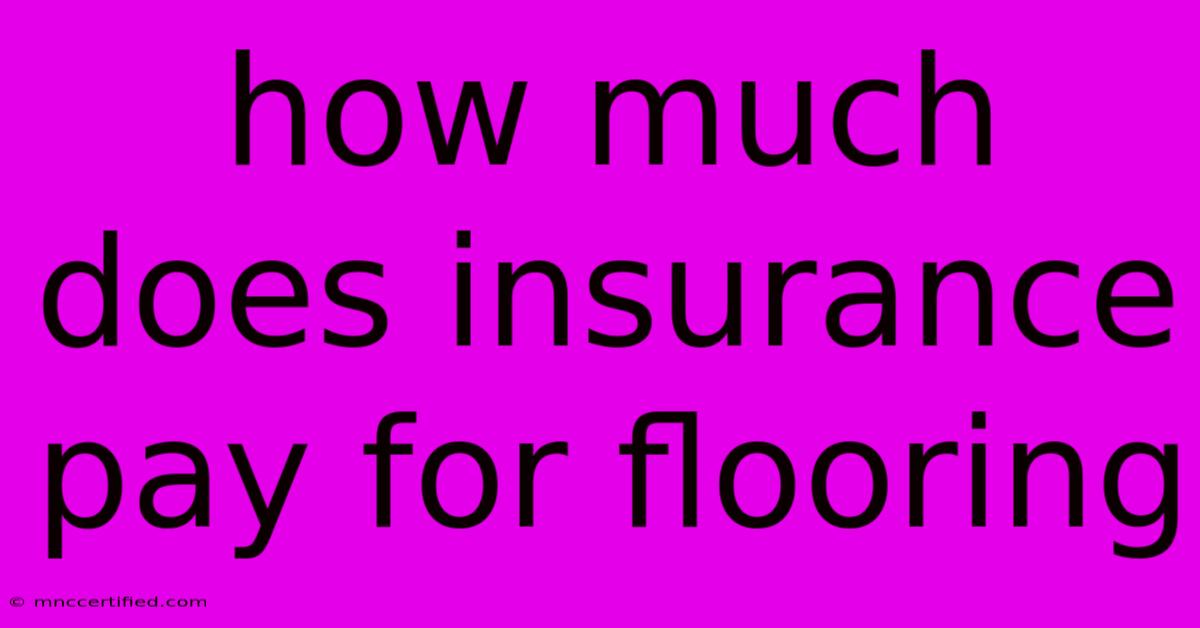How Much Does Insurance Pay For Flooring

Table of Contents
How Much Does Insurance Pay for Flooring? A Comprehensive Guide
Flooring damage can be a stressful experience. Whether it's due to a burst pipe, a fire, or a covered accident, you want to ensure your insurance covers the repairs. But how much will your insurance policy pay for flooring replacement?
This guide will delve into the complexities of insurance coverage for flooring, helping you understand what to expect and how to maximize your claim.
Understanding Your Policy
The amount your insurance pays for flooring depends heavily on your specific policy. Here's what to consider:
- Policy Type: Homeowners and renters insurance policies both offer coverage for flooring damage, but the specifics vary.
- Coverage Limits: Your policy likely has a maximum payout for each covered peril (e.g., fire, water damage). This limit might impact the extent of your flooring replacement.
- Deductible: You'll be responsible for paying your deductible before your insurance coverage kicks in.
- Coverage Exclusions: Be aware of what's excluded in your policy. For instance, some policies might not cover damage caused by wear and tear or neglect.
Common Flooring Coverage Scenarios
Let's examine some typical flooring damage scenarios and how insurance might respond:
1. Water Damage:
- Covered: Flooding from a burst pipe, leaking appliance, or storm surge are often covered.
- Not Covered: Water damage from negligence (e.g., leaving a window open during a heavy rain) might not be covered.
2. Fire Damage:
- Covered: Damage resulting from a house fire is typically covered.
- Not Covered: Damage caused by a deliberate fire or a fire started due to a known safety hazard might not be covered.
3. Accidents:
- Covered: Damage caused by a covered accident like a falling object or a broken pipe are usually covered.
- Not Covered: Damage caused by a tenant or guest might be covered under liability coverage, but the specific situation matters.
Factors Affecting the Payout
Besides your policy details, several factors can influence how much your insurance company pays for flooring:
- Type of Flooring: Certain flooring materials, like hardwood, can be more expensive to replace than others.
- Age of Flooring: Newer flooring often receives a higher payout compared to older flooring.
- Quality and Condition: The quality and condition of your existing flooring will influence the final payout.
- Local Market Costs: The cost of flooring materials and installation can vary significantly by location.
Maximizing Your Claim
Here are some tips to maximize your insurance payout for flooring damage:
- Document Everything: Take detailed photos and videos of the damaged flooring and the cause of the damage.
- Contact Your Insurance Company: Notify your insurance company immediately about the damage and follow their claim procedures.
- Get Multiple Estimates: Obtain quotes from multiple flooring contractors to ensure fair pricing for your claim.
- Negotiate: If you feel the insurance company's offer is inadequate, don't hesitate to negotiate.
In Conclusion
The amount your insurance pays for flooring replacement depends on numerous factors, including your policy details, the type of damage, and the age and quality of your flooring.
Remember to read your policy thoroughly, document everything, and work closely with your insurance company to ensure you receive the appropriate compensation for your losses. By taking these steps, you can navigate the claims process effectively and get the flooring you need to restore your home.

Thank you for visiting our website wich cover about How Much Does Insurance Pay For Flooring. We hope the information provided has been useful to you. Feel free to contact us if you have any questions or need further assistance. See you next time and dont miss to bookmark.
Featured Posts
-
Halle Bailey Calls Out Ddg Over Sons Halo
Nov 08, 2024
-
Outer Banks Season 4 Character Name Still Alive
Nov 08, 2024
-
Missing Tooth Clause In Dental Insurance
Nov 08, 2024
-
Can You Be An Insurance Agent With A Dui
Nov 08, 2024
-
Nfl Thursday Bengals Vs Ravens Game Preview
Nov 08, 2024